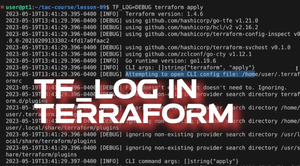🖳 Learn how to view Terraform logs and troubleshoot errors as they occur.
You can log what happens during the usage of commands such as terraform init and terraform apply. Most commonly you will make use of the following Terraform environment variables:
TF_LOG- which enables logging.TF_LOG_PATH- which configures a path and log file location.
There are five levels of logging: TRACE, DEBUG, INFO, WARN, and ERROR. TRACE is the most verbose of the five.
You'll need the following to complete the lab:
- A system running Terraform
- VSCode or a similar IDE
- Access to the video course repository: https://github.com/daveprowse/tac-course
Enjoy the video and the lab!
Basic Logging
Make sure you are working in an initialized directory.
Run the following commands:
TF_LOG=ERROR terraform init
Now, remove all Terraform directories and state files.
Run the following command:
TF_LOG=ERROR terraform apply
This should show an error (which it would show anyway)
Now, move up the ladder with WARN, INFO, DEBUG, and finally, TRACE. For example:
TF_LOG=INFO terraform apply
NOTE: TRACE is what you want when presenting logs to team members or Hashicorp support.
Persistent Logging
Set the following Terraform environment variable to allow for logging throughout the session:
export TF_LOG=TRACE
Now run a terraform apply
It logs all terraform commands for the rest of the terminal session.
Log Location
Set the following Terraform environment variable to send the logs to a file (instead of to the standard output terminal.)
export TF_LOG_PATH=logs.txt
Note: Or, output it to .terraform.log (to make it hidden)
Run terraform init or apply and check the log one by one! If you do an apply, don't say yes so that no infrastructure is created.
NOTE: These will append by default.
You can also do data subsets:
export TF_LOG_CORE=TRACEfor Terraform Core messages only.
or
export TF_LOG_PROVIDER=TRACEfor provider plugin messages only. (This) is common when troubleshooting lesser cloud services and third-party-written provider plugins such as libvirt and proxmox.)
Unset the Variables
First export TF_LOG_PATH=
The = sign sets the variable to off. This unsets the path variable.
However, it still logs to the terminal
Now, export TF_LOG_CORE=
All logging is now turned off.

